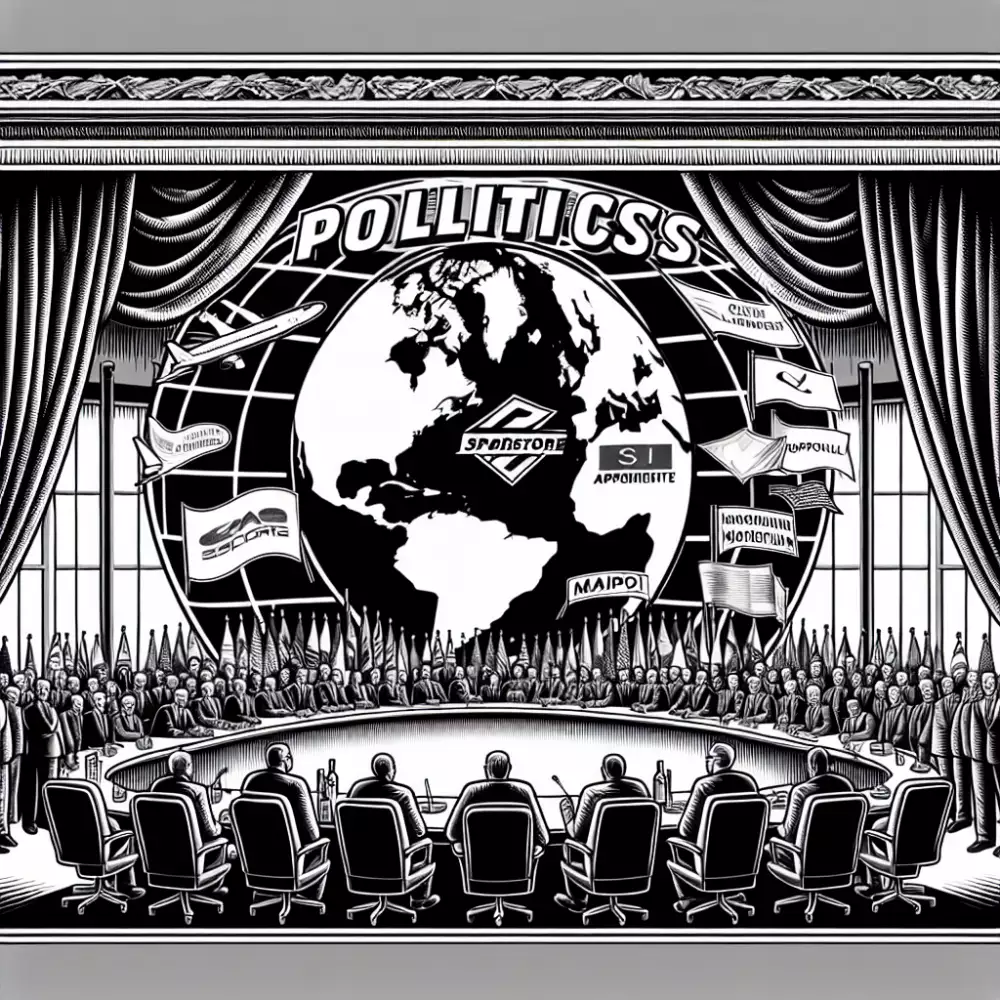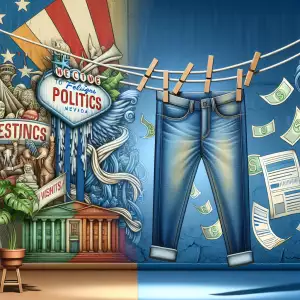Adidas Politics: Sneakers, Stripes, and Statements

- Adidas history and values
- Sustainability initiatives
- Labor practices and controversies
- Diversity and inclusion efforts
- Political endorsements and sponsorships
- Consumer activism and boycotts
- Collaborations with political figures
- Impact of geopolitical events
- Cultural appropriation accusations
- Future of adidas and politics
Adidas history and values
Adidas, a global sportswear giant, has a history deeply intertwined with politics, both on and off the field. Founded in 1949 by Adolf "Adi" Dassler in post-war Germany, the brand's early years were marked by the shadow of World War II. Overcoming initial challenges, Adidas rose to prominence by outfitting athletes who achieved iconic victories, solidifying its place in sports history.
The brand's three stripes, now a globally recognized symbol, were not just a design choice but a strategic acquisition from a Finnish company, highlighting the role of business decisions in shaping the brand's identity. Adidas' association with athletes like Jesse Owens, who famously triumphed at the 1936 Berlin Olympics, showcased the power of sports to transcend political divides.
However, Adidas' history is not without its controversies. The use of sweatshop labor in manufacturing its products drew criticism, forcing the company to confront ethical concerns and implement stricter labor standards. More recently, Adidas' partnership with rapper Ye, formerly known as Kanye West, ended abruptly due to his antisemitic remarks, underscoring the brand's commitment to distancing itself from hate speech and discrimination.
Adidas' political stances often reflect its values of diversity, inclusion, and equality. The brand has actively supported LGBTQ+ rights through campaigns and sponsorships, demonstrating its commitment to social progress. However, these stances have also sparked debate, with some criticizing the brand for engaging in "woke-washing" while others applaud its efforts to promote positive change.
Navigating the complex world of politics and social issues is an ongoing challenge for Adidas. As a global brand with a diverse customer base, its decisions are subject to scrutiny and interpretation. The company's history and values continue to shape its approach, demonstrating the intricate relationship between sports, business, and politics in the 21st century.
Sustainability initiatives
Adidas recognizes the significant impact the fashion industry has on the environment and society. They've stepped up to the plate with their sustainability initiatives, aiming to make a real difference. One of their main goals is to phase out virgin polyester by 2025, replacing it with recycled materials. This is huge, considering the massive amount of polyester used in sportswear. They're also pushing hard for closed-loop systems, where materials are reused and waste is minimized. Their "Made to Be Remade" program is a great example, allowing customers to return end-of-life products to be recycled into new ones.
But it's not just about materials. Adidas is also tackling climate change. They've committed to reducing their carbon footprint by 30% by 2030 and becoming carbon neutral by 2050. They're making their supply chain more sustainable too, working closely with suppliers to reduce their environmental impact. And of course, they're promoting fair labor practices and safe working conditions in their factories.

Adidas is transparent about their progress, regularly publishing sustainability reports and collaborating with organizations like the Better Cotton Initiative and the Parley for the Oceans. They know it's a journey, and they're committed to continuous improvement.
Labor practices and controversies
Adidas, a global sportswear giant, has faced scrutiny and criticism regarding its labor practices in various parts of the world. Concerns have been raised about working conditions, wages, and the treatment of workers in factories producing Adidas products.
One significant area of concern has been the use of sweatshops in developing countries. Critics have alleged that Adidas has sourced products from factories where workers face exploitative conditions, including low wages, long hours, and unsafe working environments. These allegations have led to protests and calls for boycotts of Adidas products.
Another issue has been the treatment of workers' rights. Adidas has been accused of suppressing trade union activity and violating workers' rights to freedom of association and collective bargaining. Reports have emerged of workers facing intimidation and retaliation for attempting to organize or raise concerns about working conditions.
Adidas has responded to these criticisms by implementing various initiatives and policies aimed at improving labor practices throughout its supply chain. The company has established codes of conduct for its suppliers, conducts factory audits, and engages in dialogue with stakeholders, including labor rights organizations.
However, despite these efforts, concerns about Adidas' labor practices persist. Critics argue that the company's monitoring and enforcement mechanisms are inadequate and that more needs to be done to address the root causes of labor exploitation in its supply chain.
The issue of labor practices in the sportswear industry is complex and multifaceted. It involves a global network of suppliers, brands, consumers, and governments. Addressing these challenges requires collaboration and a commitment to ethical sourcing and responsible business practices. Adidas, as a leading sportswear brand, has a responsibility to ensure that its products are made in factories where workers are treated fairly and with respect.
Diversity and inclusion efforts
Adidas has publicly committed to diversity and inclusion, setting specific targets for representation within the company. They aim to increase the representation of Black and Latinx employees in leadership positions in the US. They have also launched initiatives like partnerships with Black and Latinx-owned businesses and support for athletes and communities of color. However, Adidas has faced criticism and challenges related to its diversity and inclusion efforts. Former employees have alleged a disconnect between the company's stated commitments and the experiences of employees of color within the company. Some critics argue that the company's marketing and sponsorships, while diverse, sometimes appropriate or misrepresent elements of different cultures. This highlights the complexities and challenges of addressing systemic issues of race and representation within a large corporation. Adidas' situation underscores the need for companies to go beyond public statements and implement tangible changes to foster inclusive work environments and address concerns raised by employees and the community.

Political endorsements and sponsorships
Adidas, like many global brands, often finds itself navigating the complex world of politics. While the company itself doesn't endorse political parties or candidates, its actions, partnerships, and sponsorships inevitably draw scrutiny and spark debate.
One area of focus is Adidas's labor practices, particularly in its supply chains. The company has faced criticism and calls for boycotts over working conditions in factories producing its goods. This has led Adidas to engage in dialogue with labor rights groups and implement programs aimed at improving worker welfare. However, critics argue that more needs to be done to ensure fair wages and safe working conditions throughout its supply chain.
Another politically charged aspect is Adidas's sponsorships of athletes and sports teams. These partnerships can generate controversy, especially when athletes express political views or engage in activism. For instance, Adidas's sponsorship of athletes who have been vocal about social justice issues has drawn both praise and criticism.
Furthermore, Adidas's marketing campaigns sometimes touch on social and political themes, aiming to resonate with specific demographics. While these campaigns can be successful in connecting with certain audiences, they also risk alienating others who hold different views.
Ultimately, Adidas, like any major corporation, operates within a political landscape. Its decisions regarding labor practices, sponsorships, and marketing campaigns can have political implications and generate public debate. As a result, the company faces the ongoing challenge of balancing its business interests with its social responsibilities in a complex and ever-evolving political environment.
Adidas, like many global brands, often finds itself navigating the complex world of politics. While the company itself doesn't endorse political parties or candidates, its actions, partnerships, and sponsorships inevitably draw scrutiny and spark debate.

One area of focus is Adidas's labor practices, particularly in its supply chains. The company has faced criticism and calls for boycotts over working conditions in factories producing its goods. This has led Adidas to engage in dialogue with labor rights groups and implement programs aimed at improving worker welfare. However, critics argue that more needs to be done to ensure fair wages and safe working conditions throughout its supply chain.
Another politically charged aspect is Adidas's sponsorships of athletes and sports teams. These partnerships can generate controversy, especially when athletes express political views or engage in activism. For instance, Adidas's sponsorship of athletes who have been vocal about social justice issues has drawn both praise and criticism.
Furthermore, Adidas's marketing campaigns sometimes touch on social and political themes, aiming to resonate with specific demographics. While these campaigns can be successful in connecting with certain audiences, they also risk alienating others who hold different views.
Ultimately, Adidas, like any major corporation, operates within a political landscape. Its decisions regarding labor practices, sponsorships, and marketing campaigns can have political implications and generate public debate. As a result, the company faces the ongoing challenge of balancing its business interests with its social responsibilities in a complex and ever-evolving political environment.
Consumer activism and boycotts
Adidas, like many global brands, has found itself navigating the complex landscape of consumer activism and boycotts, particularly in relation to its political stances and actions. As a company with a vast international reach, Adidas faces scrutiny and pressure from diverse consumer groups with varying values and expectations.
| Feature | Adidas | Competitor (e.g., Nike) |
|---|---|---|
| Stance on Social Issues | Often vocal, supporting LGBTQ+ rights and sustainability | Generally vocal, supporting similar causes |
| Manufacturing Practices | Emphasis on ethical sourcing and fair labor practices, though criticisms exist | Similar emphasis on ethical sourcing, but also faces criticisms |
| Political Donations (US Specific) | Historically bipartisan, but recent trends lean more towards individual donations rather than corporate PACs | Historically bipartisan, with variations depending on specific political climate |
One prominent example is the call for boycotts related to sourcing practices and labor conditions. Concerns about working conditions in factories producing Adidas goods have led to activism urging consumers to pressure the brand to improve transparency and ensure fair labor practices throughout its supply chain.

Additionally, Adidas's responses to social and political movements have sparked both praise and criticism, influencing consumer perceptions and actions. Support for certain causes or statements from brand representatives can alienate some consumer segments while resonating positively with others. This complex dynamic highlights the tightrope that global brands like Adidas must walk as they navigate an increasingly polarized and interconnected world.
Ultimately, the effectiveness of consumer activism and boycotts in influencing Adidas's policies and practices remains a subject of debate. However, it is undeniable that these actions reflect a broader trend of consumers holding brands accountable for their values and actions, demanding greater transparency and ethical behavior. As consumer expectations continue to evolve, brands like Adidas will need to navigate these complexities carefully, recognizing the power of consumer voices in shaping brand perception and success.
Collaborations with political figures
Adidas, as a global sportswear giant, often finds itself intertwined with political discussions and figures. While the brand itself maintains a policy of political neutrality, its actions and partnerships sometimes spark controversy and ignite debate.
One notable example is the brand's history with Kanye West. The collaboration, known as "Yeezy," was incredibly successful but also fraught with tension due to West's outspoken political views and controversial statements. Adidas ultimately severed ties with West in 2025, citing his harmful rhetoric.
Beyond individual collaborations, Adidas has also faced scrutiny for its manufacturing practices, particularly in countries with questionable labor laws. The company's commitment to ethical sourcing and fair labor practices is constantly under the microscope, with activists and consumers demanding transparency and accountability.
Furthermore, Adidas' sponsorship of major sporting events, like the Olympics and the FIFA World Cup, inevitably draws the brand into conversations about the host countries' human rights records and political climates. These events often become platforms for protests and political statements, putting pressure on sponsors like Adidas to take a stance or risk being seen as complicit.
Navigating the complex world of politics is a constant challenge for global brands like Adidas. While striving for neutrality, the brand's actions, partnerships, and even its products can become entangled in political discourse, highlighting the increasing intersection of commerce and ideology.
Impact of geopolitical events
Adidas, like many global brands, often finds itself navigating the complex world of geopolitics. Its operations, spanning manufacturing, marketing, and sales in numerous countries, are susceptible to political shifts and events. One notable example is the ongoing trade war between the United States and China. As a company heavily reliant on manufacturing in Asia, particularly in China, Adidas has had to adjust its supply chains and strategies in response to fluctuating tariffs and trade policies.

Furthermore, Adidas' brand image and marketing campaigns are carefully crafted to resonate with a global audience. However, this requires a nuanced understanding and sensitivity to cultural and political differences. For instance, campaigns featuring athletes or celebrities taking a stand on social or political issues can be met with both praise and backlash depending on the specific context and the prevailing public sentiment in different regions.
Additionally, Adidas' sponsorship of major sporting events, such as the Olympics and the FIFA World Cup, inevitably draws the company into conversations about human rights, labor practices, and political situations in the host countries. Navigating these sensitive issues requires careful consideration and a commitment to ethical conduct to maintain a positive brand image and avoid potential controversies.
Cultural appropriation accusations
Adidas, a global sportswear giant, has faced accusations of cultural appropriation on several occasions. Critics argue that the brand has a history of profiting from and commodifying elements of various cultures without proper acknowledgment, compensation, or respect for their origins.
One notable instance involved the release of a sneaker design that drew inspiration from traditional Mexican textile patterns. The design was met with backlash, with many accusing Adidas of exploiting Mexican culture for financial gain. Critics pointed out that the brand did not involve Mexican artists or communities in the design process or share profits in a meaningful way.
In another instance, Adidas faced criticism for using Native American imagery and symbols on its products. The use of sacred and culturally significant elements as fashion statements was deemed disrespectful and insensitive by many Indigenous groups and their allies. The brand was accused of trivializing and misrepresenting Native American heritage for commercial purposes.
These controversies highlight the fine line brands must navigate when drawing inspiration from different cultures. While cultural exchange and appreciation are essential, it is crucial to approach such endeavors with sensitivity, respect, and a commitment to ethical sourcing and collaboration. Failure to do so can result in accusations of cultural appropriation, damage brand reputation, and alienate consumers.
Future of adidas and politics
Adidas, a global sportswear giant, has inevitably found itself intertwined with political discourse and social movements. As a brand with a massive platform and a diverse customer base, its actions, partnerships, and messaging carry significant weight.

One area where Adidas has faced scrutiny is its supply chain and labor practices. The company has been challenged to ensure fair wages, safe working conditions, and ethical sourcing throughout its global operations. Consumers and activist groups increasingly hold brands accountable for their social and environmental impact, pushing Adidas to maintain transparency and implement sustainable practices.
Furthermore, Adidas' marketing campaigns have sometimes sparked controversy and ignited conversations about social issues. For instance, its collaborations with athletes and celebrities who are outspoken on political matters have drawn both praise and criticism. The brand's embrace of inclusivity and diversity in its advertising has also been met with mixed reactions, reflecting the polarized political climate.
Looking ahead, Adidas will likely continue to navigate the complex intersection of business and politics. As consumers become more politically aware and discerning, the brand will face pressure to take a stand on social issues, address environmental concerns, and promote ethical business practices. How Adidas chooses to engage with these issues will undoubtedly shape its brand image and influence its relationship with consumers in the years to come.
Publikováno: 06. 07. 2024
Kategorie: Fashion



